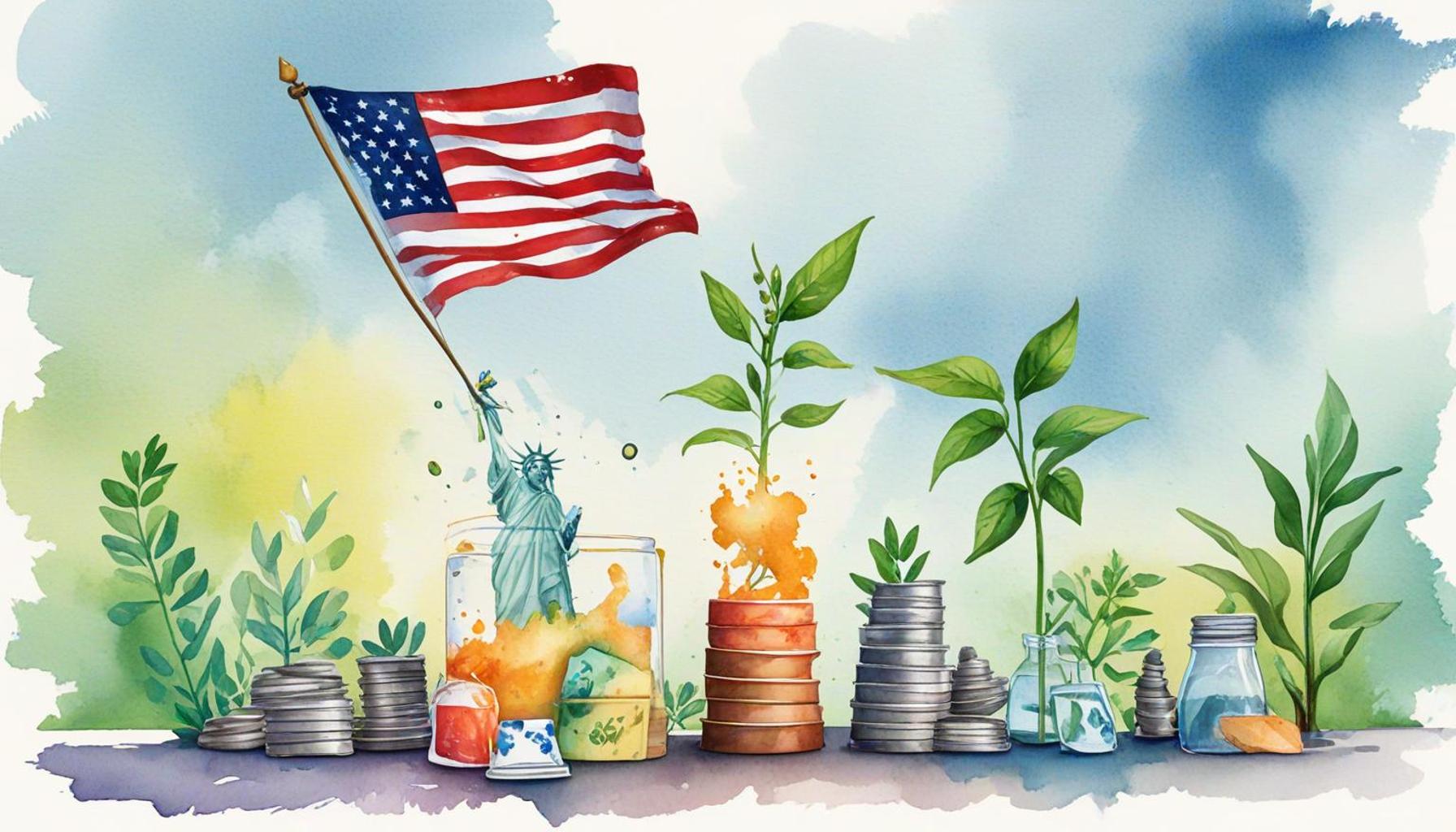Sustainable Investments in the USA: How to Invest Ethically

A Shift in Investor Mindset
As societal values evolve, many individuals are reevaluating their investment strategies to align not only with financial objectives but also with personal and ethical principles. In the United States, this growing consciousness is transforming sustainable investments from a niche into a mainstream financial strategy. Investors trust that they can achieve attractive financial returns while simultaneously contributing positively to societal and environmental issues.
Understanding Sustainable Investing
Investing sustainably encompasses a variety of criteria that go beyond traditional financial performance metrics. Some key factors that sustainable investors assess include:
- Environmental impact: This involves scouting for companies that actively work to minimize their environmental footprint, such as reducing greenhouse gas emissions or investing in renewable energy sources. For instance, firms like Tesla not only drive innovation in electric vehicles but also promote sustainable energy practices, appealing to investors who prioritize eco-friendliness.
- Social responsibility: Here, the focus is on supporting organizations that enforce fair labor practices, uphold diversity, and engage in community development initiatives. Companies that utilize ethical sourcing and actively contribute to social causes can attract ethically-minded investors. An excellent example is Starbucks, which has initiatives that ensure coffee is sourced sustainably while supporting farmers and communities worldwide.
- Governance ethics: This aspect examines the leadership and governance structures of a company, emphasizing transparency and accountability. Companies with robust governance, such as Johnson & Johnson, often appeal to investors seeking stability and ethical management.
The Rise of Sustainable Investments
Recent reports highlight a steep rise in sustainable investments, with billions of dollars flowing into this asset class yearly. Research by the Global Sustainable Investment Alliance indicates that sustainable investment assets reached a staggering $30 trillion globally in recent years, with substantial growth observed in the United States. This ascent can be attributed to several factors, including:
- Increased awareness: Heightened global attention to climate change and social justice has spurred conversations about responsible investing. Young investors, in particular, are driving this movement, as they are more inclined to support sustainable companies that align with their values.
- Demand for transparency: Investors today are more informed and inquisitive, seeking companies that exhibit accountability in their operations. The success of firms that disclose environmental, social, and governance (ESG) metrics has elevated the standard of disclosure across the industry.
- Government support: With regulators and public policy increasingly favoring environmental sustainability, initiatives that encourage green investments are becoming more common. For example, tax incentives for renewable energy projects have made these opportunities more appealing to investors.
Navigating the Future of Investing
With a plethora of options available, navigating the realm of sustainable investing can be a daunting task. Investors must remain vigilant, researching various funds and companies to ensure that their investments truly align with their ethics while achieving the desired financial returns. By understanding the principles and practices of sustainable investing, individuals have the power to create a meaningful impact while growing their wealth.
Ultimately, sustainable investing represents a powerful intersection of finance and values, demonstrating that economic success can go hand in hand with social responsibility. Investors can take pride, knowing their choices are not only beneficial for their portfolios but also for the world at large.
CHECK OUT: Click here to explore more
The Foundations of Sustainable Investing
To grasp the full potential of sustainable investing, it’s essential to understand its underlying frameworks and strategies. Beyond aligning investments with personal values, sustainable investing seeks to mitigate risk, enhance returns, and promote long-term growth. It invites investors to consider not only financial performance but also the broader implications of their capital allocation. Here are some fundamental aspects to explore:
- ESG Criteria: Environmental, Social, and Governance (ESG) criteria have become the gold standard for evaluating investment opportunities. Investors assess these factors to gauge how a company contributes to sustainability. For example, firms that prioritize reducing carbon emissions or implement inclusive hiring practices are more likely to attract responsible investors.
- Positive Screening: This approach involves selecting investments based on positive attributes. Investors might focus on companies that are leaders in renewable energy, such as NextEra Energy, or those pioneering innovations in waste management. Such selections underscore a commitment to amplifying the impact of their portfolios.
- Negative Screening: This strategy entails excluding certain sectors or companies that fail to meet ethical standards. Industries such as fossil fuels, tobacco, and arms manufacturing often fall under this umbrella. By steering clear of these sectors, investors can align their portfolios more closely with their values.
The Power of Impact Investments
One significant facet of sustainable investing is impact investing, which focuses on generating measurable social and environmental impact alongside financial returns. This method allows investors to actively support initiatives that they believe can bring about positive change. Examples include:
- Community Development Financial Institutions (CDFIs): These organizations provide essential financial services to underserved communities. By investing in CDFIs, individuals support economic growth and job creation in areas often overlooked by traditional financial institutions.
- Green Bonds: Issued by governments and corporations, green bonds fund projects that have positive environmental benefits, such as renewable energy installations and energy-efficient buildings. Investors in green bonds help drive the transition to a low-carbon economy while earning returns.
- Social Enterprises: Companies dedicated to solving social problems while earning profits can be excellent candidates for impact investments. Startups focused on affordable housing, healthcare, or education are often attractive to investors seeking to leverage their capital for a higher purpose.
Researching Sustainable Options
As the landscape of sustainable investing expands, investors have a wealth of options at their disposal. However, the diversity of myriads of funds and companies can be overwhelming. Potential investors should conduct thorough research to identify which options align with their financial goals and ethical standards. Furthermore, tracking the performance of sustainable investments can aid in shedding light on their viability. Analysts suggest that those incorporating ESG factors not only benefit from reduced volatility but may also enjoy superior long-term returns.
This pivotal moment in the investment realm underscores a broader shift towards responsible finance. By engaging in sustainable investing, individuals are not only poised to diversify their portfolios but also contribute to a future that values ethical stewardship. As more investors reserve a place for sustainability within their strategies, the potential for financial success intertwined with positive impact only accelerates, inviting all stakeholders to reconsider the true meaning of wealth.
SEE ALSO: Click here to read another article
Exploring Sustainable Investment Vehicles
Within the realm of sustainable investing, various investment vehicles serve to cater to the diverse preferences of investors eager to align their capital with their ethical values. These vehicles not only amplify the ability to create a meaningful impact but also provide unique opportunities for growth and diversification.
- Exchange-Traded Funds (ETFs): Sustainable ETFs have surged in popularity, enabling investors to gain exposure to a diversified portfolio of companies that meet specific ESG criteria. By investing in funds like the iShares Global Clean Energy ETF, which targets firms focused on renewable energy sources, individuals can harness the growing clean energy sector while benefiting from the liquidity and ease of trading associated with ETFs.
- Mutual Funds: Many mutual funds emphasize sustainability, integrating ESG factors into their investment processes. Funds such as the TIAA-CREF Social Choice Equity Fund prioritize companies with a positive social and environmental impact. Investors can choose funds tailored to different risk profiles or sectors, allowing for personalized approaches that align investment with convictions.
- Direct Investments: For those willing to identify opportunities beyond traditional fund structures, direct investments in sustainable startups or companies can yield substantial returns while facilitating innovation. Platforms like SeedInvest and StartEngine connect investors with early-stage companies focused on sustainability, providing a way to be part of the entrepreneurial wave fostering positive change.
The Role of Technology in Sustainable Investing
The integration of technology is transforming the landscape of sustainable investing, making it more accessible and efficient. Fintech innovations have introduced platforms that simplify the process of analyzing and investing in sustainable options, providing investors with detailed insights into a company’s ESG performance. These advancements include:
- Robo-Advisors: Automated investment platforms such as Wealthsimple and Betterment offer ESG-focused portfolios, allowing investors to engage in sustainable investing without the need for extensive market knowledge. With a few clicks, investors can set their preferences, thus setting their investments on a trajectory aligned with their ethical beliefs.
- Data Analytics Tools: Sophisticated data analytics tools like Sustainalytics and Morningstar’s Sustainability Rating equip investors with comprehensive data to evaluate the environmental and social impact of their investments. As a result, more informed decisions can be made about which companies deserve capital allocation.
- Blockchain Technology: As interest in transparency grows, blockchain has emerged as a promising solution. By providing immutable records of investments and the projects they fund, blockchain could enhance accountability in the realm of sustainable finance. For example, green bonds are being issued on blockchain platforms, transparently documenting their use for specific environmental projects.
Policy Shifts and Regulatory Support
The growing recognition of sustainable investing within regulatory frameworks signifies an encouraging trend for investors. The Biden Administration has emphasized the importance of climate change and ESG factors, aiming to integrate them into the economic fabric of the nation. Recent policy initiatives include:
- Climate Disclosures: New regulations introduced by the Securities and Exchange Commission (SEC) are pushing companies to disclose their climate-related risks and strategies. This shift offers investors a clearer understanding of potential risks associated with climate change and encourages companies to adopt more sustainable practices.
- Green Tax Incentives: Local and federal governments are increasingly offering incentives for sustainable investments, allowing individuals to benefit from tax breaks for supporting renewable energy projects and sustainable initiatives. For instance, the Investment Tax Credit for solar energy demonstrates how public policy can align with personal ethical aspirations.
- Financial Regulatory Frameworks: Agencies such as the Department of Labor are revising investment guidelines to support fiduciaries considering ESG factors in their investment decisions, empowering institutional investors to incorporate sustainability into their strategies.
CHECK OUT: Click here to explore more
Conclusion: The Path Forward for Ethical Investing
Sustainable investments in the USA represent a crucial intersection between financial growth and ethical responsibility. With an array of options—from Exchange-Traded Funds to direct investments in startups—investors have never had better tools to align their capital with values. Moreover, technological innovations like robo-advisors and data analytics tools empower individuals to make informed decisions, while regulatory support from the Biden Administration further legitimizes and strengthens this investment landscape.
As the demand for transparency and accountability grows, investors must remain vigilant, ensuring that their capital drives positive societal impacts without compromising returns. The evolving policies around climate disclosures and green tax incentives serve not only to enhance investor understanding but also to encourage a broader commitment to sustainability across sectors. For those looking to make their mark, now is the optimal time to engage with sustainable investing as both a financial strategy and a means of shaping a better future.
In this dynamic environment, investors are challenged—and invited—to dig deeper. Explore how different vehicles perform regarding ESG criteria, understand the implications of new regulations, and consider the influence of technology on investment practices. Ultimately, the journey toward ethical investing is not merely about financial gain; it is about participating in a movement that can reshape our economy and planet for the better. Dive in, explore your options, and be part of the sustainable investment evolution.

Beatriz Johnson is a seasoned financial analyst and writer with a passion for simplifying the complexities of economics and finance. With over a decade of experience in the industry, she specializes in topics like personal finance, investment strategies, and global economic trends. Through her work on World Information, Beatriz empowers readers to make informed financial decisions and stay ahead in the ever-changing economic landscape.





